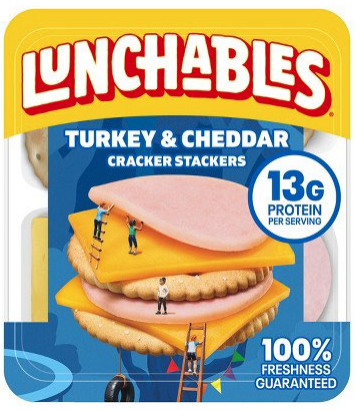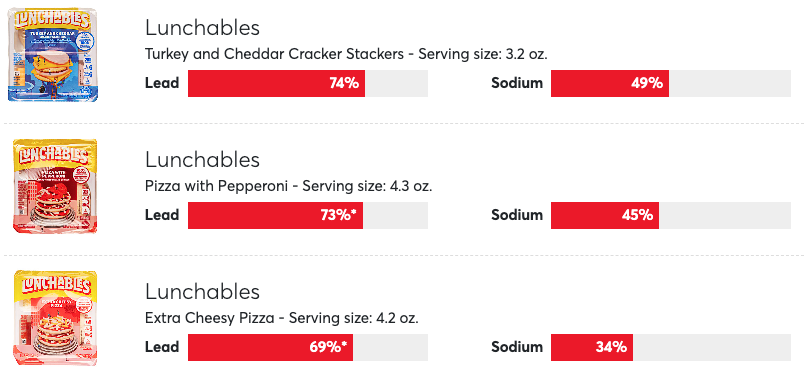Lunchables Lawsuit Alleges Cracker Stackers, Pizza Snacks Contaminated with Lead
Last Updated on July 2, 2024
Lunchables are the subject of a new proposed class action lawsuit that alleges the ubiquitous children’s snacks are contaminated with unsafe levels of lead.
Want to stay in the loop on class actions that matter to you? Sign up for ClassAction.org’s free weekly newsletter here.

The 22-page Lunchables lawsuit was filed in New York on April 17 in the wake of a Consumer Reports exposé that revealed several store-bought lunch and snack kits, including Lunchables, contained far more than California’s maximum allowable daily dose of lead. The case contends that the Lunchables at issue are “entirely worthless” and “unfit for human consumption” given that they contain, or risk containing, lead.
Be sure to scroll down to see which Lunchables are mentioned in the lawsuit.
The proposed class action lawsuit accuses Lunchables maker Kraft Heinz of deceptively and misleadingly labeling and advertising the products to consumers by failing to disclose the presence of lead, a harmful neurotoxin known to cause cognitive deficiencies, mental illness, dementia and hypertension. Lead is not listed on the Lunchables’ main label, nor in the ingredients list, the suit highlights.
Per the complaint, the contamination of Lunchables with lead is “particularly egregious” given that the snacks are marketed to be eaten by children.
“[Kraft Heinz] is using a marketing and advertising campaign that omits from the ingredients list that the Products contain lead,” the suit reads. “This omission leads a reasonable consumer to believe they are not purchasing a product with a known neurotoxin when in fact they are purchasing a product contaminated with lead.”
Consumer Reports reveals lunch, snack kits contain lead
Central to the Lunchables lawsuit is an April 9, 2024, report from Consumer Reports concerning 12 varieties of store-bought lunch and snack kits, including Lunchables, Target’s Good & Gather, Armour LunchMakers, Oscar Mayer, and other brands. Consumer Reports tested the dozen items, some of which are served in school cafeterias, for lead and other heavy metals, phthalates, and sodium, and found generally that “[t]here’s a lot to be concerned about in these kits,” including that a main ingredient in the products, processed meat, has been linked to an increased risk of some cancers.
According to Consumer Reports, testing found lead, cadmium, or both in every lunch and snack kit. The watchdog also detected at least one type of phthalate in nearly every kit that was tested, and levels of sodium that, depending on a child’s age, amounted to a quarter to a half of the daily recommended limit for sodium.
The bottom line, Consumer Reports stressed, is that “[w]e don’t think anybody should regularly eat these products,” as they’re a far cry from what can be considered a healthy school lunch.
The lawsuit echoes these sentiments and charges that consumers have been misled since the labeling of Lunchables includes no warning about the inclusion, or even the potential inclusion, of lead. Instead, the Lunchables labels mention only that the snacks are “100% Freshness Guaranteed,” the filing notes.
“Indeed, each of the Products contained more than 69% of the maximum allowable daily dose level for lead established based on California regulations,” the complaint, citing Consumer Reports, says.

Lead exposure is especially dangerous for kids, lawsuit stresses
According to the case, lead is unsafe even at low levels of consumption and has been shown to reduce intelligence and accumulate in the bones and brain, sometimes causing health problems decades down the line.
Children are particularly at risk for adverse effects of lead exposure due to their developing brains and because, in comparison to adults, less lead is stored in the bones and teeth and more is stored in the nervous system, the suit emphasizes.
The case adds that children found to have lead in their blood are recommended to have their levels monitored and potentially undergo treatment, including being fed diets high in iron and calcium and undergoing x-rays or chelation therapy.
Had Kraft Heinz disclosed the presence, or potential presence, of lead in Lunchables, consumers would not have bought the products, or would have paid less for them, the lawsuit claims.
Which Lunchables allegedly contain lead?
According to the case, the following varieties of Lunchables are contaminated with lead:
- Lunchables Turkey and Cheddar Cracker Stackers;
- Lunchables Pizza with Pepperoni; and
- Lunchables Extra Cheesy Pizza.
Who’s qualified to join the Lunchables lead lawsuit?
The Lunchables lawsuit looks to represent all consumers who bought any of the Lunchables products listed on this page during the applicable statute of limitations period.
I’ve bought Lunchables. Can I sign up for the lawsuit?
If you’ve purchased any of the Lunchables listed on this page, there’s nothing you need to do right now to join, sign up for, add your name to, or qualify for the class action lawsuit. It’s usually only in the event of a class action lawsuit settlement that the people covered by the case, called class members, would need to act. This typically involves filling out and filing a claim form online or by mail.
ClassAction.org will update this page with developments in the Lunchables class action, including if there’s a settlement, so be sure to check back often.
Are you owed unclaimed settlement money? Check out our class action rebates page full of open class action settlements.
Video Game Addiction Lawsuits
If your child suffers from video game addiction — including Fortnite addiction or Roblox addiction — you may be able to take legal action. Gamers 18 to 22 may also qualify.
Learn more:Video Game Addiction Lawsuit
Depo-Provera Lawsuits
Anyone who received Depo-Provera or Depo-Provera SubQ injections and has been diagnosed with meningioma, a type of brain tumor, may be able to take legal action.
Read more: Depo-Provera Lawsuit
How Do I Join a Class Action Lawsuit?
Did you know there's usually nothing you need to do to join, sign up for, or add your name to new class action lawsuits when they're initially filed?
Read more here: How Do I Join a Class Action Lawsuit?
Stay Current
Sign Up For
Our Newsletter
New cases and investigations, settlement deadlines, and news straight to your inbox.
Before commenting, please review our comment policy.